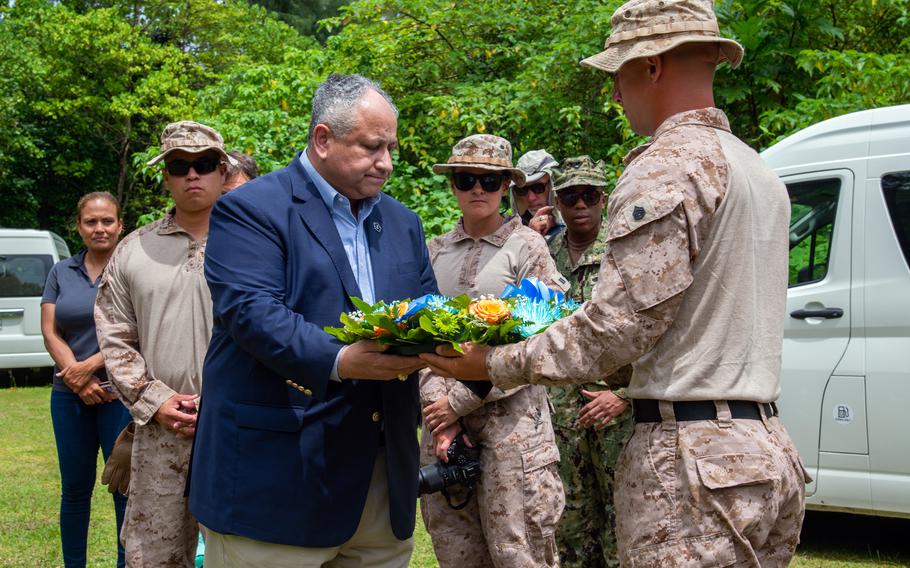
Secretary of the Navy Carlos Del Toro participates in a wreath-laying at the 81st Infantry Division Memorial in Peleliu, Palau, March 1, 2024, that honors members of the division who assisted the 1st Marine Division in the Battle of Peleliu during World War II. (Shaina Marie O’Neal/U.S. Navy)
A 20-year agreement between the U.S. and several small Pacific island nations significantly advances America’s strategic priorities in the Indo-Pacific region, a top Defense Department official told lawmakers Wednesday.
President Joe Biden signed legislation March 9 that provides $7.1 billion over two decades to the Freely Associated States of Micronesia, the Marshall Islands and Palau.
The bipartisan renewal of the Compacts of Free Associations, or COFA, between the U.S. and the three nations “ensures that the United States — and only the United States — can maintain a military presence” in those countries, Ely Ratner, assistant secretary of defense for Indo-Pacific security affairs, said in a testimony before the House Armed Services Committee.
Approving COFA funding “marked one of the 118th Congress’ most significant achievements to advance U.S. strategic priorities in the Indo-Pacific region,” he said.
The three nations lie in an expanse of sea east of the Philippines just above the Equator.
Renewing the COFA agreement was “critical,” Suzanne Vares-Lum, a retired Army major general and now director of the Honolulu-based East-West Center, said by phone Tuesday.
Crucially, the agreement precludes China from exerting more influence in the region by filling unmet needs within the three nations, Vares-Lum said
“I think it shows our acknowledgement that we are not leaving any gaps in the relationship and that the COFA agreements fulfill the government functions of each of the countries for day-to-day requirements — education, health care, families, environment, the preservation of cultural resources — of their own security,” she said.
The agreement somewhat mitigates China’s successful foray into the Solomon Islands, which lies south of Micronesia.
American and Australian officials were stunned in early 2022 when Solomon Islands announced a security agreement with China, raising the possibility that Beijing could leverage that into greater military presence in the region.
Under the renewed COFA agreement, Micronesia, Marshall Islands and Palau gain more than just the billions of funding in exchange for America’s exclusive military access to their land, waters and airspace.
Citizens of those countries are allowed to work and attend school in America, enlist in the U.S. armed services and access veterans’ health care, Vares-Lum said.
The previous COFA agreement expired last fall, and renewal had been tied up in congressional gridlock, Robert York, director for regional affairs at Pacific Forum, a Honolulu-based policy research institute, said by phone Monday.
Some U.S. lawmakers were apparently shaken out of their complacency when a leaked letter from Palauan President Surangel Whipps Jr. to a U.S. senator was posted on X on Feb. 15, York said.
The letter, posted by Cleo Paskal, a non-resident senior fellow at the Washington-based Foundation for Defense of Democracies, warned that China was upping pressure on Palau to break its diplomatic ties with Taiwan.
Palau is one of only 11 nations that maintains diplomatic relations with Taiwan, a democratically governed island China maintains is a renegade province that must at some point concede to Beijing’s control.
Whipps’ letter urged the U.S. senator, whose name was redacted, to pass the COFA legislation.
“Every day it is not approved plays into the hands of the [Chinese Communist Party] and the leaders here (some of whom have done ‘business’ with the PRC) who want to accept its seemingly attractive economic offers at the cost of shifting alliances, beginning with sacrificing Taiwan,” Whipps wrote.
In exchange for Palau breaking ties with Taiwan, China offered to “fill every hotel room ... and more if more are built” and to lease two acres for $20 million a year for a “call center,” Whipps wrote.
“There’s a lot more concern about Chinese activities in the Pacific these days,” York said, referring to the developments in the Solomon Islands. “If you look at the nations in question that are covered under this [COFA agreement], the U.S. attaches a great deal of strategic importance to them, particularly Palau, and its place in the first island chain.”